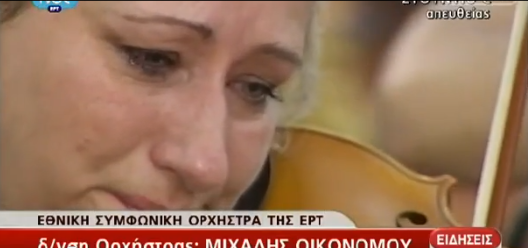Greek tragedy brought home by Elgar
The sight of this orchestra, recently laid off as a result of cuts, touched a human chord

Your support helps us to tell the story
From reproductive rights to climate change to Big Tech, The Independent is on the ground when the story is developing. Whether it's investigating the financials of Elon Musk's pro-Trump PAC or producing our latest documentary, 'The A Word', which shines a light on the American women fighting for reproductive rights, we know how important it is to parse out the facts from the messaging.
At such a critical moment in US history, we need reporters on the ground. Your donation allows us to keep sending journalists to speak to both sides of the story.
The Independent is trusted by Americans across the entire political spectrum. And unlike many other quality news outlets, we choose not to lock Americans out of our reporting and analysis with paywalls. We believe quality journalism should be available to everyone, paid for by those who can afford it.
Your support makes all the difference.The last time I had heard Elgar’s Nimrod from “Enigma Variations” was at the memorial service for my girls’ grandfather. There, amid the purist beauty of Sir Christopher Wren’s chapel at the Royal Hospital Chelsea, surrounded by elderly generals and other magnificent men and their memories, it transported me to every conflict they had collectively endured, and made me think of how many colleagues they had lost along the way. You will know Nimrod. It is played every year on Remembrance Sunday at the Cenotaph, and been used in countless movies.
Yesterday, via the miracle of Twitter, the cultural commentator Norman Lebrecht (@NLebrecht) and the BBC media correspondent Nick Higham (@highamnews), I was moved to tears again by the same piece of music played in very different circumstances. They had linked to a video on artsjournal.com in which the Greek National Radio Orchestra and Chorus played Nimrod in their hot, humid rehearsal room, where the air conditioning no longer works.
The a/c was off because the Greek government last week, without warning, closed down ERT, the Greek equivalent of the BBC. The orchestra members had just learned that, along with ERT’s other employees they were to lose their jobs. Another 2650 families added to the roll call of economic horror. The musicians played in tears as a crowd gathered in solidarity outside fell silent and watched on a video wall.
Extraordinary really, that after months of news reports from Greece, Spain, Portugal and Cyprus, this one got to me. This, and the unforgettable old man in Cyprus who had brought his wicker chair to sit on in the queue for the banks to reopen so that he could withdraw his cash.
What future for that teary female violinist and her talented friends when unemployment is 27% and rising? As a commentator on the site asked: how many hours of work and lost childhoods for the passion of music? As I write there is confusion as to whether or not there is a partial reprieve. The EBU has enabled programming to be seen on satellite, but the future looks bleak. Under pressure from EU and IMF officials to cut public sector jobs, 2500 at ERT must have seemed the lesser of several evils. It is nevertheless still an evil. A vibrant media lies at the heart of democracy. Music and the arts are grace notes that transcend the monotony and misery of everyday life. As we watch with horror what is going in Istanbul, let’s not forget that in Greece, Spain, Portugal, Cyprus and elsewhere for ordinary people, the crisis is far from over. Unemployment rises. Nothing is resolved. And, all that sparked by the genius of Elgar.
Join our commenting forum
Join thought-provoking conversations, follow other Independent readers and see their replies
Comments